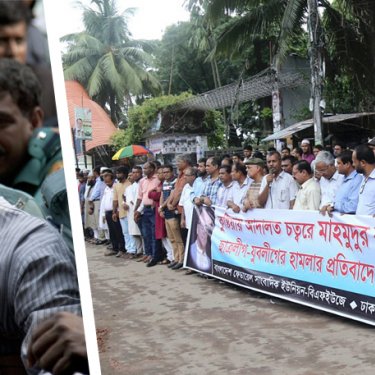Bangladeshi opposition journalist nearly lynched by ruling party activists

After well-known opposition newspaper editor Mahmudur Rahman was badly injured in a pre-meditated attack by around 100 ruling party activists on 22 July, Reporters Without Borders (RSF) calls for measures to improve guarantees for the safety of all journalists in Bangladesh in the run-up to a general election later this year.
The police did nothing to protect Mahmudur Rahman when he emerged from a court in Kushtia, in western Bangladesh, and was nearly lynched by about 100 members of the Chhatra League, the student wing of the ruling Awami League party, who had invaded the court compound and attacked him with sticks and bricks.
After sustaining several severe injuries to the head and face, Rahman managed to escape his assailants by finding refuge in the office of a lawyer within the court compound.
Rahman is the former acting editor of the now defunct Dhaka-based daily Amar Desh (“My Nation”), which supported the opposition to Prime Minister Sheikh Hasina’s government. After the newspaper was closed by the authorities in 2013, Amar Desh survived online until it was blocked in 2016. This time, Rahman had gone to Kushtia to seek bail in a criminal defamation action brought against him in connection with “derogatory remarks” he made about various political figures including the current prime minister and the late Sheikh Mujibur Rahman, the “father of the nation.”
“It is unacceptable that journalists can be the targets of such violence by political activists,” said Daniel Bastard, the head of RSF’s Asia-Pacific desk. “An exhaustive investigation must be carried out to identify all those responsible for this disgraceful attack, including those within the police.”
Bastard added: “With just months to go to a general election scheduled for late 2018, it is vital to respect all of the different groups that are fighting for democracy and pluralism in Bangladesh. This is an overriding duty for the government in Dhaka.”
The current pre-election climate is tending to hamper the work of media outlets covering stories that reflect badly on the government. Two Bangladeshi news websites, bdnews24.com and the Daily Star newspaper’s site, were briefly blocked last month by the Telecommunication Regulatory Commission, whose director said he had been acting on the orders of senior government officials.
The blocking was prompted by reports claiming that a municipal councillor in the southeastern city of Cox’s Bazar who, according to the police, was a drug dealer and had been killed in a shootout, was in fact the victim of an extra-judicial execution. The Daily Star story, headlined “Murder it was,” still cannot be accessed online.
Bangladesh is ranked 146th out of 180 countries in RSF's 2018 World Press Freedom Index.



